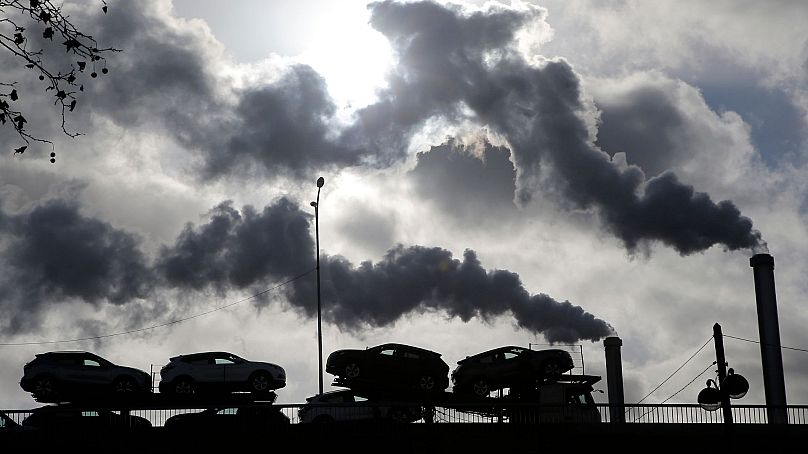‘He made the exact same promise five years ago’: Environmentalists have criticised Macron’s climate roadmap.
French President Emmanuel Macron has unveiled plans to reduce greenhouse gas emissions and meet the country’s climate-related commitments within the next seven years.
After holding a special government meeting on Monday, he laid out a new package that included reducing dependency on fossil fuels and boosting electric car use.
Macron said France’s goal to reduce its emissions by 55 per cent by 2030 compared to 1990 levels, in line with a European Union target, is “attainable”.
To get there, he said, the country must go more than twice as fast as before. “We need to succeed in reducing emissions by 5 per cent per year over the period 2022-2030” – compared with a 2 per cent reduction per year over the past five years.
“This whole strategy will enable us to reduce our dependence on fossil fuels, essentially coal, oil and gas… from 60 per cent to 40 per cent by 2030,” he added.
Will France shut down its last remaining coal plants?
Macron confirmed that the country’s two remaining coal-burning plants would cease operating and be converted to biomass energy, which is produced by burning wood, plants and other organic material, by 2027. The coal plants currently represent less than 1 per cent of France’s electricity production.
The two plants were initially set to close by last year, but the energy crisis prompted by the war in Ukraine and the shutdown of French nuclear reactors for various problems led the government to delay the decision.
France relies on nuclear energy for over 60 per cent of its electricity – more than any other country.
How will France encourage electric car use?
Another challenge, Macron said, is to boost electric vehicle use by producing cars and batteries at home.
The French “love their car, and I do,” the president said Sunday evening on national television, acknowledging the public reluctance to switch to electric vehicles with higher purchase prices than combustion-engine cars.
Macron said on Monday that the government would unveil a state-sponsored system in November to allow households with modest incomes to lease European-made electric cars for about €100 per month. That will start with a few dozens of thousands of cars next year, he added.
By 2027, he said, France will have produced at least 1 million electric vehicles and opened four battery plants in the north of the country, he said.
In addition, 13 projects of commuter trains around several big cities will receive a €700 million package from the state to enable people now taking their car to use public transport instead.

Tax credits will support France’s green transition
Macron announced earlier this year a series of incentives to support innovative industries and transition towards greener technology. They include tax credits in production areas such as batteries, electric cars, and hydrogen and wind power, as well as accelerating authorisation for industrial projects.
France is to invest €7 billion more next year in the country’s energy and climate transition compared to 2023.
Macron said the country’s 50 most climate-damaging industrial sites will formally sign a roadmap by November to reduce their greenhouse gas emissions by 45 per cent by 2030. The 50 sites account for about 10 per cent of France’s total greenhouse gas emissions.
France will ‘regain control’ over electricity prices
Macron also announced that France will “regain control” over electricity prices by the end of the year, with details to be announced next month.
The move comes as the European Union is currently working on a thorough reform of its electricity market to shield citizens from sudden price spikes, speed up the use of renewable energy sources and make the bloc more independent.
A French presidency official said France would not wait for EU changes to implement a new mechanism that will align electricity prices in France on their actual production cost in the country, which is relatively low compared to some other EU countries as it relies mostly on nuclear energy and not on gas and coal. The official spoke anonymously in line with the Elysee’s customary practices.
Nuclear energy produces much lower emissions than coal, oil or gas, but plants are very expensive to build and produce radioactive waste that remains deadly for tens of thousands of years.
The French president also said his government would triple production of “low energy” heat pumps, producing 1 million devices and training tens of thousands of people to install them by 2027.
Environmental groups have criticised Macron’s green plans
Environmental activists have criticised France’s policies as not being ambitious enough.
The French president “still hasn’t realised the scale of the climate emergency,” Greenpeace France said in a statement following Macron’s televised interview on Sunday evening.
“If he were truly ambitious and a forerunner, Emmanuel Macron would also have announced dates for phasing out fossil oil and gas,” Nicolas Nace, the organisation’s energy transition campaigner, said.
“Great, he made the exact same promise five years ago,” Yannick Jadot, a French member of the European Parliament’s Greens alliance, told news broadcaster FranceInfo news. “Let’s go for it, sparing no efforts. Let’s invest, let’s take social measures so that the most vulnerable, the most fragile, get out as the big winners of the climate transition,” he added.
Elsewhere in Europe, British Prime Minister Rishi Sunak announced last week that he’s delaying by five years a ban on new gas and diesel cars that was due to take effect in 2030, watering down climate goals that he said imposed “unacceptable costs” on ordinary people.
Source : euronews


